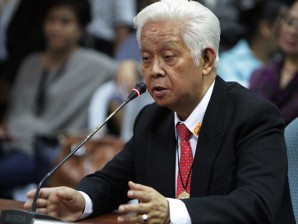Commission Elections (Comelec) chief Sixto Brillantes on Wednesday assured lawmakers that the poll body would be ready to hold automated local and national elections next year after the budget department assured it of extra funds.
Speaking at the House hearing on the Comelec budget, Brillantes said the P5 billion that was slashed from the Comelec’s 2013 appropriations would be released this year, and the amount would be used this year and next to prepare for the midterm election.
Brillantes earlier protested a P5-billion cut in the Comelec’s 2013 budget that reduced it from P13 billion to P8 billion, saying this would jeopardize the automation of the elections.
But he disclosed that the Comelec and the Department of Budget and Management have since ironed out their dispute.
With the funds coming in ahead of time, Brillantes said the Comelec would start the bidding for important services.
Fiscal autonomy
The amount left over from the P5 billion at the end of the year would be carried over for other needs next year. As a Constitutional body, the Comelec has fiscal autonomy and has the authority to do this, he added.
He assured the Comelec would be “very, very open on this continuing appropriation so there would be no insinuation we’re hiding something, or we’re concealing the savings.”
The Philippines had its first automated election in 2010, a presidential election year. Results of the vote were known in many provinces on the same day as the vote. In the past, manual counts had taken several days, sometimes weeks.
The results were generally accepted, though there were still some losing candidates who alleged that their rivals had cheated or that there were people who approached them about a technique to hack the automated election system.
Teachers’ pay
Meanwhile, ACT Teachers party-list Representative Antonio Tinio on Wednesday asked his colleagues to provide more funds to Comelec so that it could give adequate compensation to teachers tasked with poll duties.
The Comelec should be given at least P80 million more to be able to offer enough honoraria and allowances to the public school teachers and the rest of the personnel who make up the pool of election workers, Tinio said in a statement.
According to him, teachers have to work more during automated polls, as more voters are clustered in a single precinct. Teachers are also in charge of testing the precinct count optical scan machines used for voting, and need to attend training sessions before election day.
He noted that no additional allocations were provided in the Comelec budget for increased allowances for teachers.
Tinio said Brillantes had promised to retain the transportation allowance given to teachers on poll duty and to look into the possibility of increasing their honorarium.
